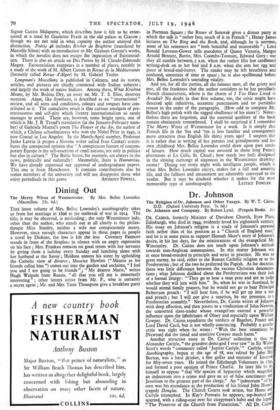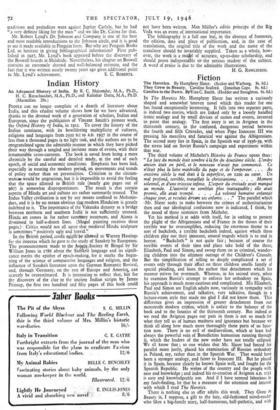Dr. Johnson
Dr. Johnson and Company. By Robert Lynd. (Penguin Books. ls.)
Da. CAIRNS, formerly Minister of Davidson Church, Eyre Place, Edinburgh, who died in 1944, evidently loved his eighteenth century. His essay on Johnson's religion is a study of Johnson's personal faith rather than of his position as a " Church of England man," and he is at some pains to support Hannah More's story of Johnson's desire, in his last days, for the ministrations of the evangelical Mr. Winstanley. Dr. Cairns does not touch upon Johnson's attitude towards non-Anglican communions. In this matter Johnson was at once broad-minded in principle and strict in practice. He was no great enemy, he said, either to the Roman Catholic religion or to the Presbyterian ; but of the two he preferred the Popish. As for doctrine, there was little difference between the various Christian denomina- tions - what Johnson disliked about the Presbyterians was their lack of a eormal liturgy : " They go to hear a man pray and are to judge whether they will join with him." So, when he was in Scotland, he would attend family prayers, but he would not go to hear Principal Robertson preach : " I will hear him, if he will get up into a tree and preach ; but I will .not give a sanction, by my presence, to a Presbyterian assembly." Nevertheless, Dr. Cairns writes of Johnson with deep affection, and then passes to a vindication of John Newton, the converted slave-trader whose evangelism exerted a powerful influence upon the lifihabitants of Olney and especially upon William Cowper. Dr. Cairns repudiates the verdicts of Bagehot, Frazer and Lord David Cecil, but is not wholly convincing. Probably a gentler critic was right when -he wrote: " With the best intentions he [Newton] did the timid and sensitive Cowper much harm."
Another attractive essay in Dr. Cairns' collection is that on Alexander Carlyle, " the grandest demi-god I ever saw " in Sir Walter Scott's words " commonly called ' Jupiter Carlyle.' " Carlyle, whose
Autobiography, begun at the age of 78, was. edited by John Hill Burton, was a hard drinker, a .fine golfer and minister of Inveresk
for fifty-seven years. He joined the Edinburgh Volunteers in 1745,
and formed a poor opinion of Prince Charlie. In later life he set himself to oppose " thatlille'-. species of hypocrisy which magnified an indecorum into a crime and gave an air of false sanctimony and
Jesuitism to the greatest part of the clergy." An " indecorum " of his
own was his attendance at the production of his friend John Homes tragedy Douglas. The Cluirch Courts took action, but Home and Carlyle triumphed. In 'Kay's Portraits he appears, top-booted and spurred, with a riding-coat over his clergyman's habit and the legend, " The Preserver of the Church from Fanaticism." All Dr. Cairns'
traditions and prejudices were against Jupiter Carlyle, but he had " a very definite liking for the man " and we like Dr. Cairns for that.
Mr. Robert Lynd's Dr. Johnson and Company is one of the best and most readable introductions to the Johnson circle, and it is good to see it made available in Penguin form. But why are Penguin Books Ltd. so hesitant in giving bibliographical information? First pub- lished in 1927, Mr. Lynd's book appeared before the discovery of the Boswell hoards at Malahide. Nevertheless, his chapter on Boswell contains an extremely shrewd and well-balanced estimate, and the fact that it was written nearly twenty years ago gives additional point



























 Previous page
Previous page